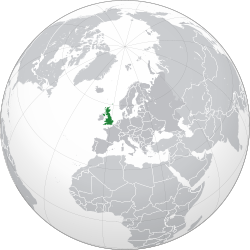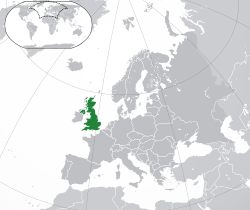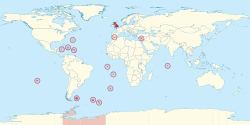
Back Британиаду AB Keurajeuën Inggréh ACE Британиешхо Пачъыхьыгъо ADY Verenigde Koninkryk AF Vereinigtes Königreich ALS የተባበሩት የሀገር ንጉሳዊ አገዛዝ AM United Kingdom AMI Reino Uniu AN Ġeānod Cynerīċe ANG यूनाइटेड किंगडम ANP
United Kingdom of Great Britain and Northern Ireland | |
|---|---|
| Anthem: "God Save the King"[a] | |
Coats of arms: Used in relation to Scotland (right) and elsewhere (left) | |
| Capital and largest city | London 51°30′N 0°7′W / 51.500°N 0.117°W |
| National language | |
| Regional and minority languages[b] | |
| Ethnic groups | |
| Religion |
|
| Demonym(s) | |
| Government | Unitary[d] parliamentary constitutional monarchy |
• Monarch | Charles III |
| Keir Starmer | |
| Legislature | Parliament |
| House of Lords | |
| House of Commons | |
| Formation | |
| 1535 and 1542 | |
| 24 March 1603 | |
| 22 July 1706 | |
| 1 May 1707 | |
| 1 January 1801 | |
| 6 December 1922 | |
| Area | |
• Total[f] | 244,376 km2 (94,354 sq mi)[12] (78th) |
• Land[e] | 242,495 km2 (93,628 sq mi) |
| Population | |
• 2023 estimate | |
• 2021 census | 66,940,559[c][14][15][16] |
• Density | 281/km2 (727.8/sq mi)[13] (51st) |
| GDP (PPP) | 2024 estimate |
• Total | |
• Per capita | |
| GDP (nominal) | 2024 estimate |
• Total | |
• Per capita | |
| Gini (2021) | medium inequality |
| HDI (2022) | very high (15th) |
| Currency | Pound sterling[g] (£) (GBP) |
| Time zone | UTC+0 (GMT) |
• Summer (DST) | UTC+1 (BST[h]) |
| Date format | dd/mm/yyyy (AD)[i] |
| Drives on | Left[j] |
| Calling code | +44[k] |
| ISO 3166 code | GB |
| Internet TLD | .uk[l] |
The United Kingdom of Great Britain and Northern Ireland, commonly known as the United Kingdom (UK) or Britain,[m] is a country in Northwestern Europe, off the coast of the continental mainland. It comprises England, Scotland, Wales, and Northern Ireland.[n] The UK includes the island of Great Britain, the north-eastern part of the island of Ireland, and most of the smaller islands within the British Isles, making up a total area of 94,354 square miles (244,376 km2).[f] Northern Ireland shares a land border with the Republic of Ireland; otherwise, the United Kingdom is surrounded by the Atlantic Ocean, the North Sea, the English Channel, the Celtic Sea, and the Irish Sea. The United Kingdom had an estimated population of over 68.2 million people in 2023. The capital and largest city of both England and the United Kingdom is London, whose wider metropolitan area is the largest in Western Europe, with a population of 14.9 million. The cities of Edinburgh, Cardiff, and Belfast are the national capitals of Scotland, Wales, and Northern Ireland, respectively.
The lands of the UK have been inhabited continuously since the Neolithic. In AD 43, the Roman conquest of Britain began; the Roman departure was followed by Anglo-Saxon settlement. In 1066, the Normans conquered England. With the end of the Wars of the Roses, the English state stabilised and began to grow in power, resulting by the 16th century in the annexation of Wales, the domination of Scotland, and the establishment of the British Empire. Over the course of the 17th century, the role of the British monarchy was reduced, particularly as a result of the English Civil War. In 1707, the Kingdom of England and the Kingdom of Scotland united under the Treaty of Union to create the Kingdom of Great Britain. The Acts of Union 1800 incorporated the Kingdom of Ireland to create the United Kingdom of Great Britain and Ireland in 1801. Most of Ireland seceded from the UK in 1922 as the Irish Free State, and the Royal and Parliamentary Titles Act 1927 created the present United Kingdom.
The UK became the first industrialised country and was the world's foremost power for the majority of the 19th and early 20th centuries, particularly during the "Pax Britannica" between 1815 and 1914. The British Empire was the leading economic power for most of the 19th century, a position supported by its agricultural prosperity, its role as a dominant trading nation, a massive industrial capacity, significant technological achievements, and the rise of 19th-century London as the world's principal financial centre. At its height in the 1920s, the British Empire encompassed almost a quarter of the world's landmass and population, and was the largest empire in history. However, its involvement in the First World War and the Second World War damaged Britain's economic power and a global wave of decolonisation led to the independence of most British colonies.
The United Kingdom is a constitutional monarchy and parliamentary democracy.[o] The UK has three distinct jurisdictions: England and Wales, Scotland, and Northern Ireland. Since 1999, Scotland, Wales and Northern Ireland have their own governments and parliaments which control various devolved matters. A developed country, the UK has the world's sixth-largest economy by nominal GDP and is the fourth-largest exporter. It is a nuclear state with one of the world's highest military budgets. The UK has been a permanent member of the UN Security Council since its first session in 1946. It is a member of the Commonwealth of Nations, Council of Europe, G7, OECD, NATO, Five Eyes, AUKUS and CPTPP. British influence can be observed in the legal and political systems of many of its former colonies, and British culture remains globally influential, particularly in language, literature, music and sport. English is the world's most widely spoken language and the third-most spoken native language.
- ^ "National Anthem". The Royal Family. Archived from the original on 20 May 2024. Retrieved 10 April 2024.
- ^ "List of declarations made with respect to treaty No. 148". Council of Europe. Archived from the original on 12 December 2013. Retrieved 12 December 2013.
- ^ "Welsh language on GOV.UK – Content design: planning, writing and managing content – Guidance". gov.uk. Archived from the original on 4 August 2018. Retrieved 3 August 2018.; "Welsh language scheme". GOV.UK. Archived from the original on 4 August 2018. Retrieved 3 August 2018.; "Welsh language scheme". GOV.UK. Archived from the original on 2 August 2018. Retrieved 3 August 2018.
- ^ "Ethnic group". Office for National Statistics. 28 March 2023. Archived from the original on 28 May 2024. Retrieved 28 May 2024.
- ^ "MS-B01 Ethnic group". Northern Ireland Statistics and Research Agency. 30 November 2023. Archived from the original on 12 August 2023. Retrieved 28 May 2024.
- ^ a b "Ethnic group, national identity, language and religion". Scotland's Census. Archived from the original on 14 May 2021. Retrieved 28 May 2024.
- ^ "Religion (detailed)". Office for National Statistics. 5 April 2023. Archived from the original on 28 May 2024. Retrieved 28 May 2024.
- ^ "MS-B21 Religion - full detail". Northern Ireland Statistics and Research Agency. 31 May 2023. Archived from the original on 13 June 2024. Retrieved 28 May 2024.
- ^ Bradbury, Jonathan (2021). Constitutional Policy and Territorial Politics in the UK: Volume 1: Union and Devolution 1997–2012. Policy Press. pp. 19–20. ISBN 978-1-5292-0588-6. Archived from the original on 2 October 2024. Retrieved 3 October 2021.
- ^ Leith, Murray Stewart (2012). Political Discourse and National Identity in Scotland. Edinburgh University Press. p. 39. ISBN 978-0-7486-8862-3. Archived from the original on 2 October 2024. Retrieved 3 October 2021.
- ^ Gagnon, Alain-G.; Tully, James (2001). Multinational Democracies. Cambridge University Press. p. 47. ISBN 978-0-521-80473-8. Archived from the original on 2 October 2024. Retrieved 3 October 2021.; Bogdanor, Vernon (1998). "Devolution: the Constitutional Aspects". In Beatson, Jack (ed.). Constitutional Reform in the United Kingdom: Practice and Principles. Oxford: Hart Publishing. p. 18. ISBN 978-1-901362-84-8.
- ^ "Standard Area Measurements for Administrative Areas (December 2023) in the UK". Open Geography Portal. Office for National Statistics. 31 May 2024. Archived from the original on 7 June 2024. Retrieved 7 June 2024.
- ^ a b "Population estimates for the UK, England, Wales, Scotland and Northern Ireland: mid-2023". www.ons.gov.uk. Office for National Statistics (ONS). 8 October 2024.
- ^ "Population and household estimates, England and Wales: Census 2021, unrounded data". Office for National Statistics. 2 November 2022. Retrieved 28 May 2024.
- ^ "2021 Census". Northern Ireland Statistics and Research Agency. Archived from the original on 3 July 2017. Retrieved 28 May 2024.
- ^ "Quality Assurance report – Unrounded population estimates and ethnic group, national identity, language and religion topic data". Scotland's Census. 21 May 2024. Archived from the original on 28 May 2024. Retrieved 28 May 2024.
- ^ a b c d "IMF DataMapper: United Kingdom". International Monetary Fund. 22 October 2024. Retrieved 11 November 2024.
- ^ "Income inequality". OECD Data. OECD. Archived from the original on 1 July 2022. Retrieved 12 February 2024.
- ^ "Human Development Report 2023/24" (PDF). United Nations Development Programme. 13 March 2024. Archived (PDF) from the original on 13 March 2024. Retrieved 13 March 2024.
- ^ "Formatting dates and times in data". gov.uk. HM Government. 9 August 2022. Archived from the original on 9 May 2024. Retrieved 1 June 2024.
- ^ What is the UK Constitution?, The Constitution Unit of UCL, 9 August 2018, archived from the original on 7 November 2018, retrieved 6 February 2020
Cite error: There are <ref group=lower-alpha> tags or {{efn}} templates on this page, but the references will not show without a {{reflist|group=lower-alpha}} template or {{notelist}} template (see the help page).




